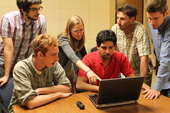Highlight
The Future of Water in California
Achievement/Results
Getting water where and when it’s needed in California is a constant challenge. Precipitation falls mostly in the north and east during the wet winter, and its storage as snow is critical for meeting dry summer demands, which occur mostly in the coastal cities and agricultural central valley. A complex network of infrastructure and governance works to address these challenges and meet competing needs for drinking water, irrigation, flood protection, hydropower, and ecosystem support. However, governance and scientific systems are fragmented, aquatic ecosystems are in serious decline, and climate change projections predict increased water demand, decreased snowpack storage, more severe floods and droughts, and sea-level rise. Further, significant uncertainties still surround hydrologic responses, so effects on water quantity and quality are largely unknown.
Students in the Climate Change, Water, and Society Integrative Graduate Education Research and Traineeship Program (CCWAS IGERT) at the University of California, Davis, organized a workshop on 8-9 April to bring together scientists and policymakers working to address these challenges. UC Davis established the CCWAS IGERT, with support from the National Science Foundation, to train students to work across the disciplines of climate science, hydrology, water management, and policy to address the effects of climate change on water resources. Their workshop included top scientists in their fields to discuss the state of climate science, hydrology, social science, and implications for resource management and planning; and decision makers who identified key research questions aimed at informing scientists about what managers and policy-makers need.
The workshop drew over 120 scientists, managers, policymakers, students, and the general public. The entities represented included federal, state, and local agencies, legislative staff, and non-governmental organizations. By creating opportunities for discussion through panels and roundtable discussions, the workshop promoted integration of knowledge and strengthened social and intellectual ties between the disparate groups to enhance communication and future collaboration. Reed Maxwell, Director of the Integrated GroundWater Modeling Center at the Colorado School of Mines and workshop speaker, commented on the timeliness of the workshop: "The interfaces are ripe for some very interesting science right now because these problems span multidisciplinary boundaries.” Kamyar Guivetchi, Manager of Statewide Integrated Water Management in the California Department of Water Resources, noted the importance of close connections between researchers and policymakers, “It’s really a governance, communication issue, and science and the technical part are inextricably a part.”
Over the next several years, CCWAS IGERT students will pursue dissertation research informed by the dialogues in the workshop. These include coupling atmospheric and hydrologic models, which currently lie at the heart of the new field of hydroclimatology, and realistically incorporating processes at the regional scale. Importantly, this information should also link to the tools used to make water management decisions. Alison Whipple, a graduate student in Hydrologic Sciences, remarked, “With my interests in how climate change and management can interact to affect environmental flows and restoration outcomes, I found that conversing with those who may apply the work I do reshaped the framing and questions of my research.” Other CCWAS students are exploring opportunities for studying land surface feedback to the atmosphere, which are important due to the interactions of human activity, hydrologic, and climatic processes. Improved understanding of the interactions between plants and the climate system will lead to better model representation of feedbacks between climate change and agriculture.
CCWAS students also seek to develop models of reservoir storage and hydropower network system behavior under a variable climate, and to find ways to incorporate uncertainty into model predictions. Further, developing and using new techniques to reduce and quantify this uncertainty will advance knowledge and prioritize actions, particularly in planning and management applications. Finally, human impacts on the hydrologic system are profound, but decision making is poorly represented in models. Incorporating human decision-making has the potential to make hydrologic models more useful for planning.
Address Goals
In planning the workshop, the CCWAS students sought to create cross-pollination between those generating new scientific knowledge and those applying it, with the overarching goal of improving California’s water management and preparedness for climate change. According to Amber Mace, associate director of the UC Davis Policy Institute for Energy, Environment, and the Economy, “This is the kind of program that will grow up our future leaders who get it, who have the background in science and the understanding of what decision makers need.” Graham Fogg, a professor of hydrogeology and principal investigator of the CCWAS IGERT, commented to one of the graduate students about the workshop: "You students are doing it right now, in this room, with these people, you’re making integration happen.”
The CCWAS students will continue to make integration happen by writing a short workshop summary for inclusion in a trade publication widely read by both academic researchers and agency staff. This will enable water managers and scientists who weren’t able to attend the workshop to benefit from some of the insights developed by participants. In the longer term, they will write a more full description of the workshop, integrated with a literature review, as a white paper that describes the state of hydroclimatology and water policy in California. By doing this, we expect the students to increase their awareness of policy issues, use this awareness to define research goals, and communicate their research to decision makers and the public in a way that affects or transforms policy. Andrew Altevogt, a workshop panelist and Assistant Executive Officer of the Central Valley Water Board, summarized, “You need people who are versed in both science and policy and how to bring it together. Society needs people who do science well and can…have conversations with other scientists, policymakers, and economists. And we in the policy realm need to act.”







